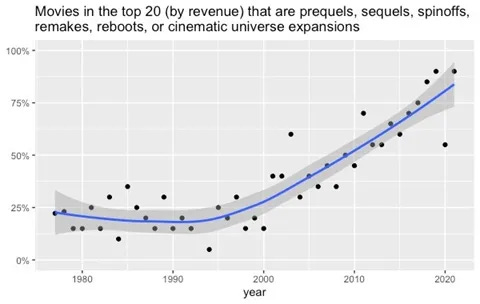
Educated people have a series of defences against the notion that changes in technology unleash sinister forces that threaten civilisation as we know it.
Here is how they deploy them
As evidence of a postmodern, postliterate society leading us into a new dark age, Claire Lehmann, the founding editor of Quillette, cites Robert Kennedy Jr’s fatal hatred of vaccines, Tucker Carlson’s jaw-dropping account of being attacked by demons, Candace Owens dismissing the moon landing as “fake” and, please don’t ask me to explain why, “gay,” and that well-known enemy of vice, Russell Brand, selling amulets to ward off “evil energies”.
She warns that,
“When an audio-visual narrative culture—which lacks the precision and permanence of written documentation—combines with amateur methods, our collective ability to discern the truth simply deteriorates.”
The correct response from educated readers is to issue a world-weary sigh and say that, in imagining a rational past, Lehman is “yearning for a golden age that never existed.”
The same applies when academics say that their students “no longer arrive at college—even at highly selective, elite colleges—prepared to read books.”
The correct response in this case is to dismiss them as Nilanjana Roy of the Financial Times dismissed them on Thursday.
We should not “panic,” she said. “I believe that Gen Z are changing what it means to be a reader as they surf between print, digital and audio.”
Indeed, ever since Stanley Cohen published Folk Devils and Moral Panics in 1972, the correct response to fears of crime, immigration and technological change has been to mock and denounce them as paranoid fantasies.
And often it is right to be dismissive. Every new technology and youth movement from mods and rockers to punk, from video games to text messages has produced hostility.
But there has always been a problem
with the moral panic analysis –and that problem is staring us in the face today.
It’s not just that sociologists rush around like Corporal Jones shouting, “don’t panic, don’t panic.”
People who consider themselves progressive can end up in a small-c conservative position that the world never really changes.
It's all very well ridiculing moral panics. But what if panic is a rational reaction? What if the cries of “keep calm and carry on” from the sociology department are complacent folly.
Three case studies show why social media and the arrival of AI give every reason to panic today.
Sometimes the Jeremiahs have a point
1/ The propaganda explosion
Anyone who thinks that there is nothing new under the sun should look at Romania’s election today.
The scandal it provoked could not have happened at any other moment in history.
To recap, the Romanian judiciary intervened to stop the original ballot and disqualify Călin Georgescu, a Romanian ultra-nationalist, and anti-Ukrainian, because Russia was flooding social media with propaganda.
To push him from obscurity to front-runner, Russia used 25,000 pro-Georgescu TikTok accounts in what Romanian analysts said was a coordinated attempt to sway the election in Georgescu’s favour. Accounts on X, Telegram and Facebook followed suit.
Imitating the tactics of QAnon, the Russians invented stories of child abuse in high places. They then supplied a heroic (if fictional) backstory for their candidate and turned him into “a UN whistleblower who exposed an international paedophilia ring”.
Online propaganda is cheap to manufacture. AI is about to make it cheaper and far more convincing as audio and visual deepfakes become next impossible to distinguish from reality.
There are no easy solutions for liberal democracies. They can ban candidates as Romania has done. But that is to insult the electorate.
Democracy rests on the assumption that all adults are worthy of determining their nation’s future. But the Romanian authorities are implying that the voters are stupid children who cannot be trusted to see through the propaganda of hostile foreign powers. The elite must intervene and decide for them which candidates they can and cannot vote for.
As you can imagine, there has been a backlash in Romania against the judiciary’s intervention. George Simion, an equally right-wing candidate who opposes aid to Ukraine and cheers on Trump and Putin, was ahead going into today’s vote. Europe may be lucky – but he could easily win.
Social media and AI raise insoluble problems. Either western societies allow themselves to be subverted with propaganda from hostile forces or they censor their elections and risk a backlash.
To say that those of us terrified by the power of AI, deepfakes and social media are “panicking” is to fail to understand the severity of the situation.
2/ The stagnation of popular culture
Once they turn 40, academics are always likely to complain about falling standards and bemoan the triumph of pop culture. In our time something new is happening: pop culture itself is stagnating. An increasing number of American films are franchises, sequels, remakes.
Keep reading with a 7-day free trial
Subscribe to Writing from London to keep reading this post and get 7 days of free access to the full post archives.



